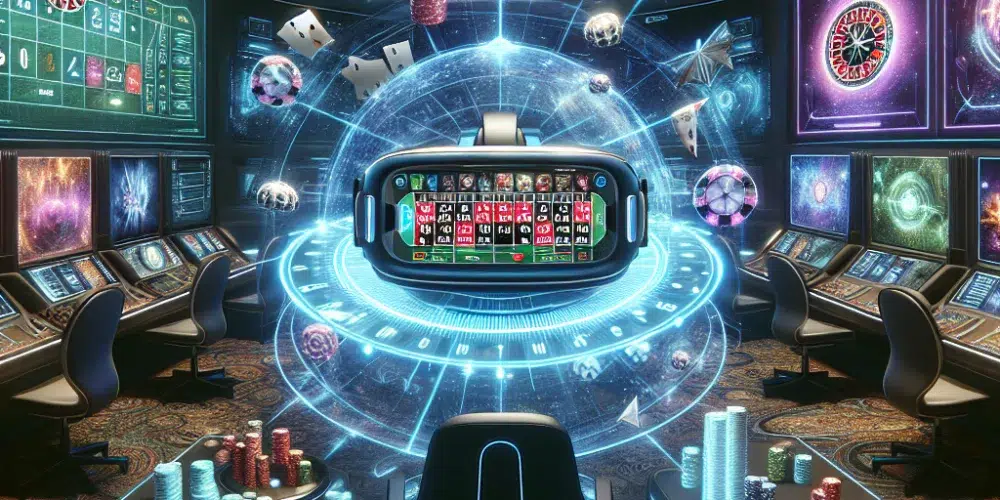The Emergence of Immersive Casino Experiences
In the constantly evolving landscape of the casino industry, 2024 marks a significant year as virtual reality (VR) technology revolutionizes how gamblers interact with casino games. The advent of VR casinos is not just a technological advancement but a redefinition of gaming experiences, offering players the thrill of Las Vegas from the comfort of their homes. This article delves into the transformative impact of VR on the casino sector, exploring its capabilities, challenges, and what it means for the future of gambling.
The Mechanics Behind VR Casinos
Virtual Reality casinos use VR technology to create a fully immersive gaming environment. Players wear VR headsets to experience a three-dimensional casino world where they can walk around, interact with other players, and engage in games as if they were in a physical casino. The realism doesn’t stop at graphics and interactions; it extends to game tables, slot machines, and even the subtle ambience of chatter and clinking coins typical of a casino floor.
The technology employs advanced motion tracking and spatial awareness tools to translate the player’s real-world actions into the virtual environment. Thus, when a player gestures to pull a slot machine handle or toss blackjack chips on a table, the system interprets these actions seamlessly into corresponding in-game actions.
The Current State of VR Casinos
As of 2024, several leading software developers like NetEnt and Microgaming have pioneered VR versions of their most popular games. For instance, NetEnt’s VR Starburst slot offers a cosmic, immersive experience that brings the star-studded, fast-paced game to life in three dimensions. Meanwhile, Microgaming’s VR roulette takes the classic table game to a whole new level, with a highly interactive wheel and a realistic casino atmosphere.
One of the unique aspects of VR casinos is their ability to solve the issue of player trust, a common hurdle in online gambling. By using VR, players can see a digital but realistic representation of random number generators, card shuffles, and other mechanisms that ensure game integrity.
Challenges Facing VR Casinos
Despite the excitement surrounding VR casinos, there are substantial hurdles to overcome. The cost of VR equipment and the technological demands required for smooth, high-resolution experiences are significant barriers to entry for average consumers. Additionally, there is the challenge of ensuring that these immersive experiences do not lead to problematic gambling behaviors due to their intense realism and accessibility.
Moreover, regulatory frameworks for VR gambling are still in nascent stages. Legislators and regulatory bodies are scrambling to catch up with the technology to ensure a safe gambling environment for players.
The Future of Gambling with VR
Insights from industry experts suggest that VR will continue to grow in popularity, potentially becoming a standard in online and mobile casinos. According to James Carlton, an independent casino analyst, “VR casinos are expected to attract a younger demographic, eager for interactive gaming experiences that go beyond traditional gambling.”
Furthermore, as VR technology becomes more accessible and affordable, there is substantial potential for widespread adoption across different segments of the casino industry. This not only includes home users but also physical casinos incorporating VR zones to provide guests with novel experiences.
Player Case Studies
Case studies of early adopters show promising engagement metrics. For instance, Liz, a seasoned online gambler from Nevada, shared, “VR casinos offer an exhilarating experience that you can’t get playing traditional online games. It’s like being in Vegas without the travel!”
Key Takeaways
– Innovative Technology: VR transforms casino gaming by offering realistic, immersive experiences.
– Enhancing Game Integrity: VR allows players to view gaming mechanisms, building trust.
– Demographic Shift: Younger players are drawn to interactive, engaging gaming experiences.
– Regulatory Development: As VR casino popularity grows, so does the need for comprehensive regulatory measures.
FAQs on Virtual Reality Casinos
1. What equipment do I need to play at a VR casino?
– Players need a VR headset and compatible controllers, along with a robust computer or mobile device that supports VR software.
2. Are VR casinos safe to play?
– Yes, provided they are licensed and regulated. VR technology also enhances transparency in game mechanics.
3. Can I interact with other players in a VR casino?
– Yes, most VR casinos offer interactive features that allow you to engage with other players in real-time.
4. How realistic are the games in VR casinos?
– Extremely realistic, with detailed environments and interactive game elements that mimic the feel of a real casino.
In conclusion, the integration of VR technology into the casino industry is set to redefine traditional gambling paradigms. As we move further into 2024 and beyond, it will be fascinating to see how this innovative technology continues to evolve and reshape the gaming landscape.

















